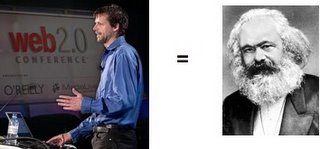
Does Web 2.o = Karl Marx?
Interesting article from CBS (?). Click on the title of this posting to go direct to the article (or paste this into your browser:
http://www.cbsnews.com/stories/2006/02/15/opinion/main1320641.shtml
It's REALLY intersting. He's comparing the whole Web 2.0 world (what the internet is becoming and something we, ClickCaster, are focused on as a company) to Karl Marx.
The author (a Fellow named Andrew Keen from, it seems, News Corp.. hmmm) references Lawrence Lessig as being an Intellectual Property Communist (twice). Lessig created something called Creative Commons (www.creativecommons.org) that provides a different way of licensing intellectual property which is much more open and built on top of the assumption that intellectual property can be shared (and, at the same time, owned by it's creator).
Ever talk to Lessig? He's more of a capitalist than people know. He's just able to see beyond the current model to the next model. He understands what 'the Network Effect' is within a legal intellectual property context. (short network effect lesson: one fax machine: useless. two fax machines: useful. A million fax machines: really useful. Every new fax machine added to 'the network' the more valuable each new fax machine becomes. Same with user generated media like blogs and podcasts- Each new piece of media, that can be built on by others... via Lessig's creative commons licensing, has a similar network effect.. but in the media space. I know.. the connection isn't intuitively obvious.. but trust me.. it's there and Lessig completely get's it).
This article was written by a guy who (obviously) is threatened by the way media is changing (as he should be. Old School thinker that he is).
The old saying: "The power of the press belongs to those who own one" was never more true. Started with the Mac and a laserwriter.. Web 2.0 is just a logical extension of that trend and started back in the mid 80's when everyone could 'own' their own printing press (i.e. a Mac & a Laserwriter).
Clever title though (Web 2.0 Is Reminiscent Of Marx). I actually laughed out loud when I read it (and thought: what a riot.. this guy has no clue how far from wrong he is) I'll admit that it's a bit of a paradox (high tech capitalists talking about revolution of the media) but, trust me.. it's all about capitalism. The individual. Making money. AND doing it in a way that's 'good'. Things Ann Rand would have loved.
This is simply the (currently assumed) best approach to meeting the market demand for what people really want (which is what, in the end, the market IS, afterall). ;-)
Old media is scared sh*tless right now. And it should be. It's under siege, and it's losing, for the first time in it's history. And not just on an attention level, but on an economic one. The dot com bust was the best thing that ever happened to technologists like me. It made it really obvious that a solid business model and way of making money from the 'idealism' of our products was paramount. So, we adapted. And we're doing it, first, by deconstructing and replacing the old (and taking money out of their pockets). And the old media? Well, it really, truly, doesn't know what to do about it. Other than calling Web 2.0 'Marxist'.



